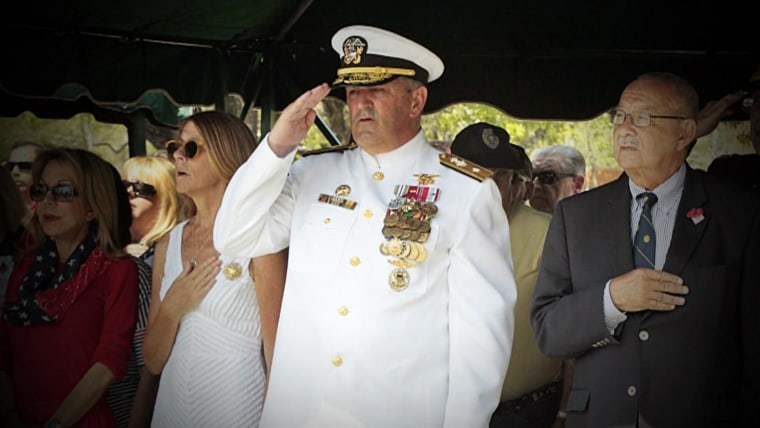WASHINGTON — A Navy SEAL candidate who died hours after he completed the grueling stretch of training known as Hell Week succumbed to acute pneumonia and cardiac arrest, according to a military investigation obtained by NBC News.
A Naval Special Warfare Command Line of Duty investigation, which was completed last month, found Seaman Kyle Mullen died in the line of duty, not because of his own misconduct.
But the Armed Forces Medical Examiner’s autopsy report, which is included in the investigative report, also found that when Mullen died in February, his heart was more than twice the normal size. An electrocardiogram of his heart nine months earlier had found no abnormalities, according to the Navy’s investigation.
Medical experts who reviewed his case for the investigation were split over whether his enlarged heart was a side effect of the arduous training or possibly due to the use of performance enhancing drugs, or PEDs, after drug paraphernalia were found among his possessions.
When he died on Feb. 4, Mullen had just completed the fourth week of Basic Underwater Demolition/SEAL (BUD/S) training, commonly known as Hell Week. Beginning on a Sunday afternoon and ending Friday morning, Hell Week exposes candidates to extreme stress to simulate intense combat situations, including training in harsh environments, long periods of swimming in punishing cold water and sleep deprivation.
Training to be a Navy SEAL is punishing, and Hell Week is among its toughest parts. Of the roughly 1,500 students who enter BUD/S training every year, only about 250 complete it, according to the Navy.
It was Mullen’s second attempt to finish the BUD/S course after heatstroke derailed his first attempt in summer 2021.
During Hell Week, he had respiratory problems, including fluid in his lungs, coughing and difficulty breathing, rapid weight gain and swelling in his legs, and disorientation, according to the investigation. Medical professionals examined Mullen every day that week, but his symptoms were common among many of the candidates, and, according to witnesses, he declined more medical attention for fear it would exclude him from completing his training.
By the time he successfully completed Hell Week, Mullen had gained 22 pounds from swelling and fluid retention, and he had to return to the barracks in a wheelchair. Witnesses reported that he was coughing and spitting up red-tinged fluids and that by that afternoon he was bloated and gasping for air and that his skin was turning blueish, a witness said.
Several hours later, paramedics found him unresponsive in his barracks. He died at a hospital that evening.
According to multiple witnesses interviewed for the investigation, symptoms like Mullen’s are common among candidates after Hell Week and do not necessarily raise suspicions among fellow sailors. A post-Hell Week brief to students warns “swelling of your extremities is typical” and can last for several days, and it recommends that they elevate their hands and feet. The paramedics who found Mullen were at the barracks responding to another SEAL candidate who was also struggling to breathe.
At least six other students went to a Navy hospital over the four days after Hell Week, according to the investigation.
The Armed Forces Medical Examiner autopsy report did not find performance enhancing drugs contributed to Mullen’s death, but it found his heart weighed 700 grams, more than double the standard for an adult male.
Multiple military medical professionals reviewed the documents about Mullen’s death for the Naval Special Warfare investigation, and while they agreed that he died from acute pneumonia, an enlarged heart and ultimately cardiac arrest, they were split over whether those symptoms caused his ultimate heart failure or were warning signs of his cardiac distress.
Several of the experts noted that use of steroids can cause an enlarged heart. A Navy Bureau of Medicine expert wrote that chronic use of PEDs like recombinant growth hormone and exogenous testosterone can be associated with enlarged heart and that “if [Seaman] Mullen had been using these PEDs, then such use could have contributed to his abnormal heart mass and thickness on autopsy,” adding, “However, it is impossible to know the frequency or duration of PED use by SN Mullen.”
A professional consulted for the investigation said other factors contributing to Mullen’s death included “the use of prohibited performance enhancing drugs (PEDs), possible swimming induced pulmonary edema (SIPE), and the rigorous physical demands of BUD/S Assessment and Selection.”
Mullen’s heart was 64.7% over the upper limit of the range for someone of his age, fitness and build, the report says, and anabolic steroid use is associated with an enlarged heart and sudden cardiac death. Another medical professional says PEDs can contribute to fluid retention and even susceptibility to infection, but that is also in dispute, with a separate assessment calling it “speculative.”
Mullen “was in possession of and suspected of misusing several PEDs,” a medical professional wrote, including Anastrobol, recombinant human growth hormone and testosterone, all of which can be used to increase muscle mass. Drug paraphernalia were among Mullen’s possessions after he died, but it is unclear whether they belonged to him or another candidate, according to multiple people familiar with the investigation.
Multiple witnesses and classmates interviewed for the investigation said they had no direct knowledge that Mullen was using PEDs.
‘Safety concerns’
Mullen’s death and the ensuing investigation have shed new light on the simmering issue of the use of PEDs among elite members of the military, especially during extreme training.
The commander of Naval Education and Training Command is conducting a separate investigation into the circumstances of Mullen’s death, as well as the broader issues it raised, including the use of PEDs. The Navy expects to have some conclusions from the training command by the end of the year, a military official said.
“Our deepest sympathy extends to Seaman Mullen’s family and friends during this difficult time,” Rear Adm. Keith Davids, commander of Naval Special Warfare Command, wrote in a statement. “NSW remains committed to transparency and we welcome the opportunity to review our assessment and selection programs, and help us look for additional ways to improve and prevent this kind of tragedy from happening again.
“Kyle’s death will not be in vain. We have a moral obligation to learn everything we can from Kyle’s tragic death so that we can ensure the safety of all future candidates,” Davids wrote.
Since Mullen’s death, candidates are now tested for PEDs at least five times during training. Just two months after Mullen died, a candidate tested positive for PEDs and was removed from training, according to the Navy.
After Mullen died, Naval Special Warfare also began advanced cardiology screening for all candidates. Of the 656 candidates who have undergone cardiac screening since February, two have been found unfit for full duty because of cardiac issues. Naval Special Warfare also now gives candidates Bicillin to prevent pneumonia, it has extended the post-Hell Week medical observation time, and it is working to expand its authority to test for PEDs.
Naval Special Warfare said “there was enough evidence of PED use within the [training] class to raise safety concerns.” As of Sept. 22, Naval Special Warfare said, it had tested 1,244 personnel for PEDs and then removed 51 people from training because of “safety concerns.”
Source: | This article originally belongs to Nbcnews.com












